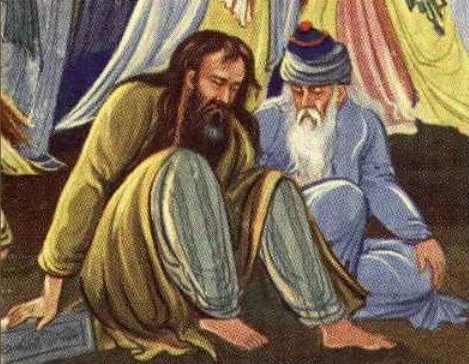
Rumi’s relationship with Shams Tabrez was a central influence on his poetry, and many of his poems express the intense emotions and experiences of their spiritual connection
SHOUKAT LOHAR
Maulana Jalaluddin Rumi was a 13th-century Persian Sufi poet and theologian, whose works have been widely translated and continue to inspire people around the world.
His poetry is nown for its profound spiritual and philosophical insights, and his message of love, unity, and spiritual transformation has resonated with readers for centuries.
Rumi was born in 1207 in Balkh, which is now part of present-day Afghanistan. His family moved to Konya, in modern-day Turkey, when he was a child, and it was there that he spent most of his life. He was a scholar of Islamic law and theology, but his life changed dramatically when he met the wandering dervish Shams Tabrez.
Shams Tabrez was a spiritual mentor and friend to Rumi, and their relationship was one of the most important influences on Rumi’s life and work.
Rumi was transformed by his encounter with Shams. His poetry reflects the deep spiritual and emotional connection that they shared.
Rumi’s poetry is characterized by its use of metaphor, symbolism, and imagery to convey spiritual truths and insights. His work is also known for its musical quality, as many of his poems were intended to be sung or recited aloud. Rumi’s poetry is often described as ecstatic, as it expresses the intense emotions and experiences of the mystic path.
One of Rumi’s most famous poems is “The Guest House,” which speaks to the idea of accepting all experiences and emotions as part of the spiritual journey:
This being human is a guest house.
Every morning a new arrival.
A joy, a depression, a meanness,
Some momentary awareness comes
As an unexpected visitor.
Welcome and entertain them all!
Even if they are a crowd of sorrows,
Who violently sweep your house
Empty of its furniture,
Still, treat each guest honorably.
He may be clearing you out
For some new delight.
This poem reflects Rumi’s belief in the importance of embracing all aspects of life, both positive and negative, as opportunities for spiritual growth and transformation.
Another famous poem by Rumi is “The Essential Rumi,” which speaks to the idea of transcending the limitations of the self and connecting with the divine:
Out beyond ideas of wrongdoing and right-doing,
There is a field. I’ll meet you there.
When the soul lies down in that grass,
The world is too full to talk about.
Ideas, language, even the phrase ‘each other’
Doesn’t make any sense.
This poem reflects Rumi’s belief in the importance of transcending the limitations of the ego and connecting with the divine essence that exists within all beings.
Rumi’s relationship with Shams Tabrez was a central influence on his poetry, and many of his poems express the intense emotions and experiences of their spiritual connection. One example is “I Am Wind, You are Fire,” which speaks to the idea of the merging of two souls in love:
I am wind, you are fire,
We ignite together and become one.
And then, we disappear
Into the nothingness
From which we came.
This poem reflects Rumi’s belief in the transformative power of love and the merging of two souls into one in the pursuit of spiritual union.
______________
 Shoukat Lohar is Assistant professor in English at Mehran University of Engineering and Technology Jamshoro. He can be reached at Shoukat.ali@faculty.muet.edu.pk
Shoukat Lohar is Assistant professor in English at Mehran University of Engineering and Technology Jamshoro. He can be reached at Shoukat.ali@faculty.muet.edu.pk